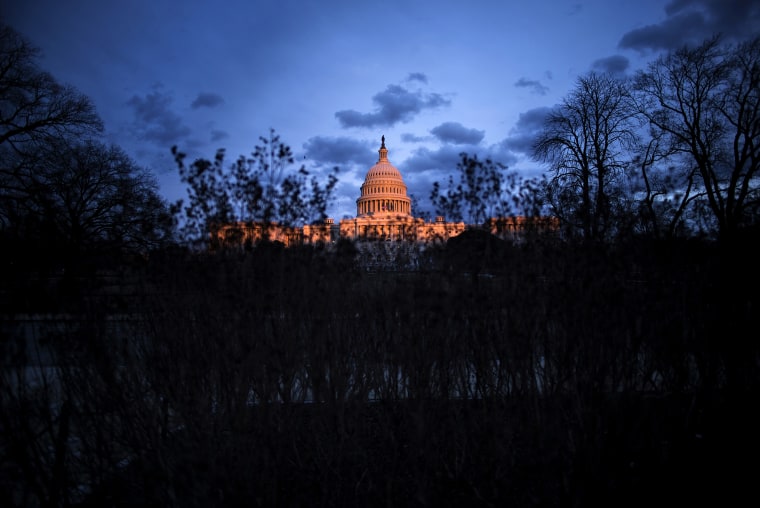Congress finally got its act together last month to pass the first full budget in years. But the fiscal drama that's consumed Washington for the past three years might not be over just yet.
Unless Congress acts quickly, the government will exhaust its ability to pay its bills by the end of February, Treasury Secretary Jack Lew warned Monday.
"Time is short. Congress needs to act to extend the nation’s borrowing authority, and it needs to act now," Lew said at the Bipartisan Policy Center.
Congress avoided breaching the debt ceiling by temporarily "suspending" it as part of October's deal to end the shutdown. (Lawmakers similarly suspended the borrowing limit in February 2013, allowing the country to avoid default without technically raising the debt ceiling, thus giving Republicans political cover.)
But the suspension ends this Friday, February 7, when the Treasury Department will be forced to resort to so-called "extraordinary measures" to finance the government—essentially using accounting maneuvers to buy Congress more time.
The government will have less wiggle room this time around, making it imperative that Congress acts sooner than later, Lew warned. "Unlike other recent periods when we have had to use extraordinary measures to continue financing the government, this time these measures will give us only a brief span of time."
In previous go-arounds, Lew explained, Treasury was able to defer certain large trust fund investments in Social Security and other entitlement programs. However, the timing of the debt limit this month means such measures won't be available. What's more, outgoing tax refunds mean that the government's cash reserves will also be depleted faster than at other times of the year. That's why both Lew and outside analysts estimate that the government's borrowing capacity will be exhausted by the end of February.
"Absent action by policymakers, there is a very real chance that Treasury would not have sufficient cash-on-hand to cover all obligations due as soon as February 28," the Bipartisan Policy Center explains.
Republican leaders say they don't expect a debt-ceiling debacle, but they've also refused to commit to a clean hike of the borrowing limit, as Democrats have demanded. In a Sunday interview on CBS News, House Leader Eric Cantor said he was "confident there will be no default," but demurred when asked whether there would be a clean debt-ceiling increase.
"What I believe is we can work something out, and I'm hopeful that the President and the Senate will work with us in the House to actually do what has typically been done with debt ceilings, which is making some progress towards addressing the spending problem in Washington, making some progress toward trying to grow the economy around the debt ceiling," Cantor said, adding that President Obama's refusal to negotiate on the matter would be "ignoring the problem."
Despite such rhetoric, Republicans still don't have a clear list of demands for a debt-ceiling vote, floating everything from Keystone XL pipeline approval to Obamacare tweaks at the House GOP retreat last week. And unlike in October, Republicans overwhelmingly agreed to pass a $1 trillion spending measure last month, making them as responsible as Democrats for the discretionary bills that need to be paid.
Economists warn that more debt-ceiling brinksmanship could threaten to slow an economy that's finally picking up steam. "The principal threat to stronger U.S. economic growth this year is a policy mistake. Most immediately, Congress must raise the Treasury debt limit again," says Mark Zandi, chief economist at Moody's Analytics.
The country has already paid a steep price for Congress's fiscal feuding. The economy grew faster than expected in the fourth quarter of 2013, with GDP growth of 3.2 percent. But economic growth would have been even higher—reaching 4.2 percent last quarter—had it not been for October's shutdown and debt-ceiling fight. And already, the government's short-term borrowing costs started rising last week as investors have grown wary of another debt-ceiling stand-off.
The cost of fiscal brinksmanship has prompted some to call for an end to the debt-ceiling altogether. Contraints on federal borrowing first came into effect between World War I and World War II as a way to check government borrowing. But the debt limit is no longer a sensible, effective mechanism for fiscal policy-making, argues Rudolph Penner, former director of the Congressional Budget Office under President Reagan.
"The real place to negotiate over spending and tax matters is when you're debating the budget resolution....having a separate debt limit, I don't think has served much of a purpose," Penner said at Monday's Bipartisan Policy Center event. "My first choice is to get rid of the debt-limit law altogether."
